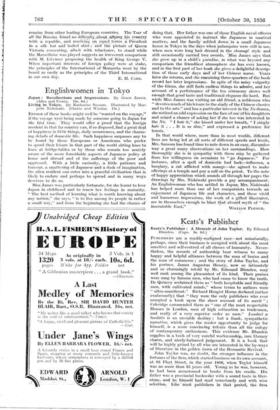Englishwomen in Tokyo
Japan : Recollections and Impressions. By Grace James. (Allen and Unwin. 10s. 6d.) Living in Tokyo. By Katharine Sansom. Illustrated by Mar. jorie Nishiwaki. (Chatto and Windus. 15s.) EITHER of these books might well be "wanted on the voyage," if the voyage were being made by someone going to Japan for the first time. bicy would offer a proof that the foreign resident in that far country can, if so disposed, find a great deal of happiness in little things, daily occurrences, and the charm-
ing details of domestic life. Such happiness surpasses any to be found by those Europeans or Americans who prefer to spend their leisure in that part of the world sitting knee to knee at bridge-tables or by those who remain too acutely aware of the more formidable aspects of Japanese policy at home and abroad and of the sufferings of the poor and oppressed. With a little curiosity, a little patience and humour, a smattering of Japanese and a dash of imagination, the alien resident can enter into a graceful civilisation that is likely to endure and perhaps to spread and in many ways deserves to do so.
Miss James was particularly fortunate, for she learnt to love Japan in childhood and to renew her feelings in maturity.
" The best method of learning what is worth knowing about any nation," she says, " is to live among its people in rather a small way," and from the beginning she had the chance of
doing that. Her father_was one of those English naval officers who were appointed to instruct the japanese in nautical matters, and the family- seftled .down- in a small Japanese house in Tokyo in the days wheripalanguins were still in use, when men wore long hair dreaded in the ehomagi style and still occasionally carried two swords. 'Miss James says that she grew up in a paradise, in what was beyond any comparison the friendliest atmosphere she has ever known, and in the first part of her book she gives a delightful descrip- tion of those early days and ofher Chinese nurse. Years later she returns, and the remaining three-quarters of the book record her later impressions.- In spite of the- noisy vulgarity of the Ginza, she still finds endless things to admire, and her account of a performance of - the tea ceremony shows well enough that-good taste and traditional elegance die hard. But while Miss James was visiting an old friend, a_ nobleman who " devotes much of his leisure to the study of the Chinese classics and to the arts" and has a particular interest in the No drama, she noticed an odd expression on the face of one of his daughters and seized a chance of asking her if she too was interested in the No. " I hate it," she hissed under her breath, hate it : . . It is so slow," and expressed a preference for tennis.
In that world where, more than in most worlds, different lives are being led at all sorts of different speeds and levels, Mrs. Sansom has found time to note dmin in an easy, discursive way a great many observationa on her surroundings. How thoroughly she is in sympathy ;kith them May be gathered from her willingness on occasions to " go Japanese." For instance, after a spell of doMestie bad luck7-influenza, a burglary, a cat afflicted with mangeshe agreed to make offerings at a temple and pay a call on the priest. To the note of happy appreciation which sounds all through her pages the drawings by Mrs. Nishiwaki provide a gay accompaniment. An Englishwoman who has settled in Japan, Mrs. Nishiwaki has helped more than one of her compatriots towards an enjoyment of Japanese life and character, and these vivid and humorous impressions, the work of a gifted illustrator, arc in themselves enough to blast tiiat absurd myth of " the
. .
vrILLIA3I PLOMER.




















































 Previous page
Previous page